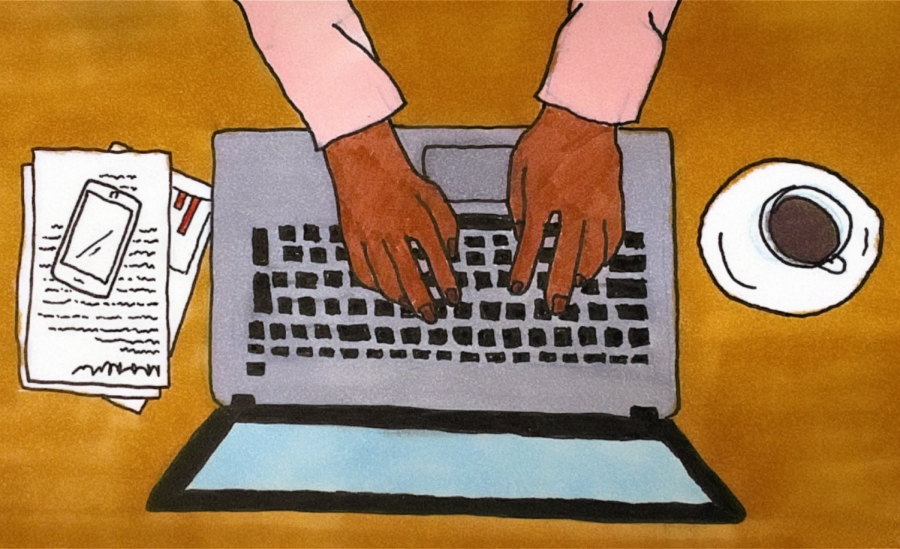Get your gender expectations out of my inbox
April 9, 2021
If you’ve ever received an email from me, I’m sure you’ve noticed my bubbly email persona. Virtually every email I send has at least one exclamation point, one smiley face and probably one or two “thank you’s.” Regardless of topic, my emails convey kindness and excitement. While these writing characteristics are seemingly harmless, they are not without purpose or consequence.
Emails are notoriously hard to intonate. They are, arguably, the worst medium through which to communicate tone and intention, and for marginalized communities that are overly policed on their communication styles, emails can be a site of major scrutiny.
Women and nonbinary people are judged particularly harshly on our email styles. An exclamation point can mean the difference between being labeled the “office bitch” or being labeled “too emotional” to get the job done.

When it comes to communication in the workplace, women and nonbinary people are subject to a double standard. If we are “feminine” in our email style or language, we are unprofessional and unfit for responsibility. If we are “masculine” in our communications, we are cold and hard to work with.
I am using “feminine” and “masculine” here to denote gender roles and expectations, but it is important to note that feminine/masculine is a false dichotomy and reifies the destructive hierarchy I am discussing in this article.
Stereotypically “feminine” email communication is energetic and collaborative, likely filled with lots of “I thinks” and “pleases” and “thank you’s.” When marginalized folk, especially women and feminine-presenting people, use this language, we are regarded as too talkative and too frivolous to handle responsibilities.
“Professional” emails are seen as “masculine,” as straightforward and to the point. These emails may include a lack of small talk, use of definitive punctuation and more directly stated demands. When women, nonbinary folk and other marginalized individuals use this communication style, we are often chastised for “harsh” or heavy-handed language.
These biases, especially in the age of the COVID-19 pandemic, can turn an otherwise enjoyable work or school experience sour. With so much of our day-to-day lives mediated through screens, it doesn’t take much for these small interactions to escalate from micro-aggressions to full-on discrimination.
When we comply with these gender roles, women and nonbinary folk are relegated to domestic and administrative tasks while denied leadership roles and proper pay. When we deviate from these gender roles, we are condemned (sometimes publicly) in the workplace and expected to defer to our colleagues.
Whether it’s through email communication or dress codes, the standards of professionalism need to change. Women and feminine-presenting people are expected to be accommodating and courteous, while others are given permission to be blunt and directive. While the expectation in the workplace is for masculine communication styles, is not more productive or efficient than other language styles.
Even in The Wire and in newsrooms around the world we prioritize curt and directive language because it is “easier to understand.” We contribute to the myth that male-driven and male-influenced language is the best and most accessible form of communication.
I write my emails the way I do because I deserve to be taken seriously regardless of how I fit into sexist expectations. Professionalism is not synonymous with masculinity, and a more generous communication style is not indicative of a lack of capability.
I prefer to communicate in an open, welcoming manner, but if I wanted to be more direct and serious, I should be allowed to do so without repercussions. This is a lose-lose situation for all of us, regardless of identity, and the longer we mediate intention and value through gendered expectations, the longer we will all suffer from these standards.







Holly • Dec 13, 2021 at 6:03 am
I can’t agree with this article enough! We should be “allowed” to communicate in email in the style that we feel most comfortable instead of worrying about how it will be perceived. It would actually lend to a more productive working style if we spent less time trying to be perceived as “professional” in our email and instead just left to do our jobs.
Janet Davis • Apr 11, 2021 at 8:08 am
Dana, thank you for writing this!
With Buyaki Nyatichi ’20, I recently published an article titled,”Values and Politics of a Behavior Change Support System.” We analyzed opinion pieces responding to a GMail plugin named “Just Not Sorry” that “warns you when you write emails using words which undermine your message” – that is, words associated with “feminine” speech patterns. I concluded that differences in opinion about the tool mainly come down to how one answers three questions: First, is it right? Second, does it work? And third, does it matter?
In reviewing the published opinions, nearly everything I found was grounded in liberal feminism, with just a few opposing perspectives grounded in cultural feminism. You add a new perspective grounded partly in radical feminism, which I really appreciate.
Find a short version of my research talk here: https://youtu.be/omqZBn19CV4
A long version is here: https://youtu.be/4o5CS75jTCA
And while I recommend it with a heaping teaspoon full of salt, here’s a link to the tool itself: https://chrome.google.com/webstore/detail/just-not-sorry-the-gmail/fmegmibednnlgojepmidhlhpjbppmlci?hl=en-US